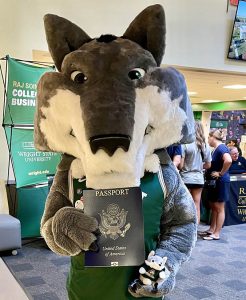 While most students and graduates went home or stayed in Dayton after Spring Semester ended, about 140 Wright State University students boarded planes to travel to eight foreign countries for 10 to 30 days of learning and personal growth.
While most students and graduates went home or stayed in Dayton after Spring Semester ended, about 140 Wright State University students boarded planes to travel to eight foreign countries for 10 to 30 days of learning and personal growth.
The number of students is significant because it represents a near-return to international study figures that were common at Wright State before the COVID-19 pandemic.
Wright State’s University Center for International Education (UCIE) organized the faculty-led study abroad programs from May 1 to Aug. 20.
The groups are traveling to:
- France, to study its language and culture
- Germany, to study engineering
- Greece and Italy, in a Lake Campus-based program to study the history of those countries
- Japan, to study its culture
- Poland, to study biology and psychology by observing animals
- Spain, to study its language and culture, notably through food
- Taiwan, to study engineering
“We’re excited to have these numbers,” said Joy Wanderi, associate director of UCIE and director of the Education Abroad and Exchange programs.
The drop-off in travel caused by the pandemic “really hit us, but we’re recovering,” she said. “We’re almost at pre-pandemic levels. We’re making good strides.”
Because increases in travel costs have become a barrier to study abroad participation, Wright State offers students study abroad scholarships.
For those who are driven to experience life overseas, even for a brief time, the rewards are great. Wanderi said after the pandemic many students returned to classrooms at a loss for how to connect with others in person.
“We were socially isolated,” she said.
Participating in international travel takes students out of their comfort zone.
“It’s a hard thing to go into a different culture, but it helps you make friends and discover yourself,” she said.
Wanderi has seen a change in students who participate in study abroad programs when they return to Wright State.
“They’ve changed for the better, significantly. Some had been shy but not when they returned,” she said. “It helps you grow as a person. The change is priceless.”
In addition to personal benefits, listing international study on a resume helps when students enter the workforce, added Michelle Streeter-Ferrari, director of the University Center for International Education.
“It enhances job opportunities,” she said. “Communications, problem-solving and teamwork are skills developed in study abroad.”
When students return to Wright State from their study abroad trips, they are invited to re-entry workshops to talk in a group setting about what they learned academically and personally.
“It gives them the opportunity to talk about what to do with their experience,” she said. “The students can articulate these experiences for their resumes.”
 The students are also encouraged to engage with international students at Wright State, like in a buddy system.
The students are also encouraged to engage with international students at Wright State, like in a buddy system.
Another persistent result of studying abroad is that students will participate in the program again.
In addition to their individual impacts on participating students, study abroad programs have a positive effect for Wright State overall. More high school students are looking for a university with international education programs, Wanderi said.
“They are asking about study abroad, not only for their degree, but for the learning experience,” she said. “For us to say we have a study abroad program puts us on the map. We hope the seeds we’re planting with this current contingent of students who will return from abroad will go a long way to adding to the recruiting efforts.”
Students can learn more about studying abroad at studyabroad.wright.edu.

 Wright State names Rajneesh Suri dean of Raj Soin College of Business
Wright State names Rajneesh Suri dean of Raj Soin College of Business  ‘Only in New York,’ born at Wright State
‘Only in New York,’ born at Wright State  Wright State president, Horizon League leaders welcome new commissioner
Wright State president, Horizon League leaders welcome new commissioner  Wright State celebrates homecoming with week-long block party
Wright State celebrates homecoming with week-long block party  Wright State baseball to take on Dayton Flyers at Day Air Ballpark April 15
Wright State baseball to take on Dayton Flyers at Day Air Ballpark April 15 